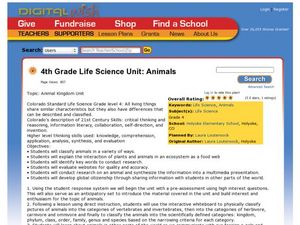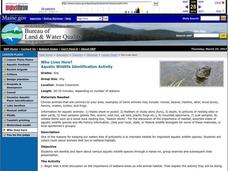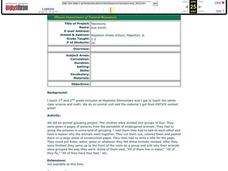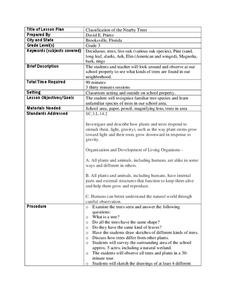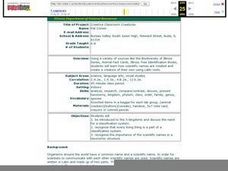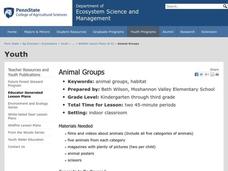Curated OER
Classification of Animals
Sixth graders examine two-way classification systems using four mutually exclusive groups and two dimensions simultaneously. They then are given a set of plastic animals, asked to create a two-way classification system, then asked to...
Curated OER
Introduction to Classification
Fourth graders design a classification system to categorize animate and inanimate objects. They discuss the advantages of grouping things as they classify buttons, leaves, shells.
Curated OER
Classification of Cerealites
Students create a dichotomous key. In this categorizing lesson, students create a dichotomous key for different types of cereal. Students classify the cereal into groups such as flakes and cereal with holes. Students discuss their...
Curated OER
From Curiosity Cabinet to Museum Collection
Learners study binomial nomenclature and museum-based research. They create a curiosity box, label the objects in their curiosity box , develop a classification scheme for the objects, and create a database of all objects collected by...
Curated OER
Local Animal Sort
Young scholars examine the concepts of sorting and classifying animal. They use familiar animals to determine the connections between physical characteristics and categorization.
Curated OER
Around-The-World-Zoo
Junior biologists design and maintain a website about a zoo by researching, classifying, and providing the correct habitats for the animals they choose to have in their zoo. This technology-based project can last over an entire semester...
Curated OER
What's Your Classification
Learners classify animals. In this animal groups instructional activity, students watch a video on animal groups and review the six animal groups. Learners practice classifying animals using stuffed animals.
Curated OER
4th Grade Life Science Unit: Animals
Fourth graders classify animals. For this animal kingdom lesson, 4th graders research animal habitats and behaviors. Students connect to a zoologist via SKYPE and learn about animal classification. Students blog about preserving animal...
Curated OER
Pair the Plants: An Introduction to Scientific Names
Learners examine why plants have both common and scientific names, then complete the activity by matching each common plant name with its scientific name. They finish by working in cooperative groups to create an ABC of Plants class book.
Curated OER
Animals, Animals, Everywhere
Fourth graders participate in a variety of activities dealing with animal characteristics and classifications in this multi-task lesson. They use graphic organizers, make booklets, and make models.
Curated OER
Classification, Keys, and Phylogenetci Trees
Students analyze relationships about animals and create a model of classifications based on both the similarities and the differences. They also discuss a dichotomous key before they create a cladograph using different types of candy.
Curated OER
Animals, Soil, Trees
Fourth graders describe the various kinds of soils and how plants and animals are affected by them. They describe the baic needs of plants, scoring at least a 3 or 4 on a 4-point rubic. Students are able to predict and/or infer what...
Curated OER
Investigating Evolutionary Questions: Bats, Whales, Reptiles, Birds, Animal Classification
Students are guided through a process in which three questions are addressed by retrieving beta hemoglobin sequences from online databases, and using online tools to compare those sequences in student-selected animals.
Alabama Learning Exchange
Animal, Insect, and Bird Classification
After completing a unit on animal classification and attending a field trip students e-mail a trusted adult with some information about animal classification. They detail what they have learned about classifications of animals, insects...
Illinois Department of Natural Resources
Section One: What is Biodiversity?
Four intriguing and scientific activities invite learners to explore the natural resources of their town. The activities cover concepts such as genetic traits, organizing species in a taxonomy, the differences between different species...
Curated OER
Who Lives Here?
Learners identify various aquatic wildlife species. In this biology instructional activity students collect clues about animals that live in wetland habitats. Learners rotate through several stations displaying particular animal species...
Curated OER
What's Your Genus? Scientific Classification and the VT
Students understand the definition of binomial nomenclature. For this binomial nomenclature lesson, students classify ordinary animals by seeking their scientific names. Students participate in a knowledge hunt using binomial nomenclature.
Curated OER
The Kingdoms
Students review the various categories in taxonomy. In groups, they identify the characteristics of each kingdom and compare and contrast them. They define the terms binomial nomenclature and morphology. To end the activity, they...
Curated OER
Taxonomy
Learners work together to identify groups of endangered animals. Using a pamphlet, they group the pictures according to specific criteria and cut the pictures out and color them. They place the animals in the correct habitat and share...
Curated OER
Species Diversity and Phylogeny
Students explore the classification system of organisms: taxonomy. They examine prepared slides of Protozoans and record information on a Taxonomy Recording Sheet. Two additional classifying activities are also included in this lesson.
Curated OER
Classification of the Nearby Trees
Third graders practice using classification techniques to identify local trees. In this plant life instructional activity, 3rd graders discuss how trees differ from other plants and what characteristics are unique to trees alone....
Curated OER
Creative Classroom Creatures
Students are introduced to the five kingdoms and discover why there is a need for a classification system. Using the internet, they examine how scientific names are created and practice putting animals into their correct classification....
Curated OER
Classification 2: A Touch of Class
Students examine how many kinds of living things (e.g. plants and animals) can be sorted into groups in many ways using various features to decide which things belong to which group and that classification schemes vary with purpose.
Curated OER
Animal Groups
Students explore animal groups. In this animal science lesson, students use pictures from magazines and classify the animals into five categories. Students share why they categorized the animals the way they did.







